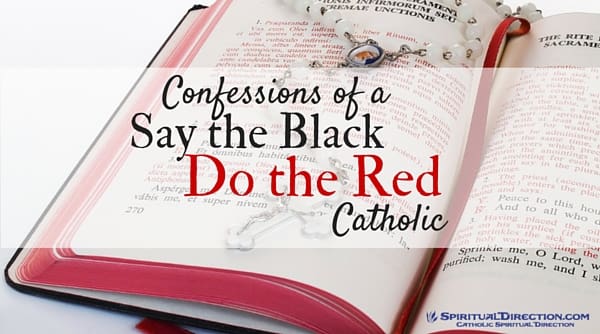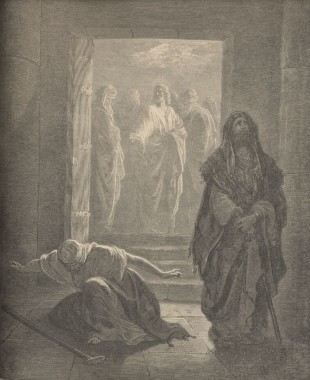Confessions of a “Say the Black Do the Red” Catholic
It is hard to extend mercy when one is not intimately familiar with one’s own failures. Most don’t realize that the Pharisees were stalwart orthodox. They were deeply committed to their faith. However, they had strayed interiorly. Their faith was one of external adherence and they thought that this was the entirety of the life in God. Jesus’ rebukes of this problem were not new and were echoed throughout the Old Testament.
I have no doubt that the Pharisees would have loved the phrase, “Say the black do the red.” By the way, I always say “Amen!” when I read it myself. Here’s the hard part: external orthodoxy is a distorted orthodoxy when it is not accompanied by a properly oriented interior life.

What does a holy interior life look like? It is found in a soul that is deeply aware of its own failures and need for a savior. It is found in humility. We know this because Jesus rebuked the prideful orthodox of his time and praised the man who wouldn’t dare raise his eyes to heaven but instead bowed his head and pleaded, “Have mercy on me, a sinner.”
Authentic orthodoxy does “say the black and do the red.” But it does so both interiorly and exteriorly. The interior disposition to obedience is because authentic orthodoxy is completely sold out to God. It recognizes the boundaries as acts of love that we are invited to, not merely rules to be followed out of duty. Duty is good, but it is an immature expression of fidelity that must lead to a more mature expression and motivation based on gratitude and love.
These boundaries are what it means to live within a covenant of love with God. This love then emanates from us and, like Christ, draws all who are seeking answers to life’s most important questions. This love reflects an orthodoxy that draws the broken-hearted and the spiritually thirsty to the receive the authentic in eternal Water of Life.
How do we know if we, the vehemently orthodox, would be rebuked or embraced by Christ? How do we know of we are stuck in a distorted, rather than authentic, orthodoxy?

Here are a few questions we can ask ourselves to determine the answer:
Are we deeply aware of our own sins and frailty or are we more aware of the sins, mistakes, and errors of others?
When others fail or seem to demonstrate a lesser commitment than ours, or seem to live outside of the boundaries of orthodoxy, are we quick to throttle them as the wicked servant did in the gospels?
Do we fail to see that conversion is a process and that each person is somewhere on the path and that not all actually know the path and how they should proceed; or do we always attribute negative motives or weak commitment and then criticize or condemn on that basis?
Are we patient, kind, gentle, and respectful with others as the Holy Spirit has clearly instructed us to be in scripture, or are we impatient, harsh, critical, unkind, or disrespectful as we engage those with whom we disagree?
Do we spend much of our time arguing and debating with others on the internet or are we actually giving our lives to the tangible service of our communities, our parishes, and those in need both of the works of corporal and spiritual mercy?
Do we fail to see the providential hand of God active in redemption and the leading of His Church and thus do we only see and constantly complain about the human failure and frailty in the Church?
Do we demonstrate the joy of the presence of God within us that is fostered by daily mental prayer and frequent participation in the sacraments and that reflects a peace and love that dominates our hearts even in the most challenging of times? If we do have that joy, does it show on our faces or are we always dour, sour, and downtrodden?
As a zealous convert, I must admit that I began my faith living out a distorted orthodoxy. I was quick to condemn, assume motive, and argue with pride and arrogance. I had a shallow but strongly held conviction that love and truth were the same in essence. Even now, I tend to fall back into this trap.
I am deeply disturbed by this part of my present and past. In the past, I read past the innumerable passages in the gospels that spoke of mercy and focused on those few that justified my arrogant rants on behalf of the truth. In fact, I focused on those passages of Jesus scourging the temple and his other rebukes as if I knew what he knows and thus could issue such harsh judgment with absolute certainty. I had raised myself to the status of Supreme Judge.
One day I realized, and was recently reminded by the same readings in the gospels, that Jesus reserved the bulk of his harsh words for those who were the orthodox of his time. I realized that I was the target of these rebukes and that I needed an interior conversion that maintained my commitment to “say the black and do the red” but that would be concomitant with an interior conversion that reflected a more authentic orthodoxy.
This interior conversion would lead me to greater patience with those who may be deceived or off the path (as defined by the Church, not by me). It would lead me to be “quick to listen, slow to speak, and slow to anger” and to temper my arguments with kindness and respect. It would lead me to err on the side of assuming the best instead of the worst in others. It would lead me to begin to see others as Jesus did, as sinners who were and are as deeply flawed as I am and who need to know love and mercy, often before they could understand the truth (as Pope Francis is constantly reminding us).
God is nowhere near finished with me. The summit I once perceived that I had climbed successfully now seems like the beginning of my journey. I am a sinner saved by grace. Though I deeply desire it, I know very little of what it means to be a saint. God, help me to be kind and patient as You are. God, help me to see and stay on the path. Lord Jesus, have mercy on me, a sinner.
+
Painting: The Pharisee and the Publican, by Gustave Doré, PD, Source



